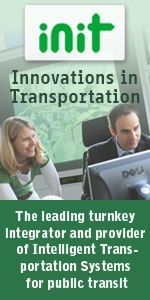

| In This Issue |
| » BREAKING NEWS |
| » NEWS HEADLINES |
| » IN DEPTH: TECHNOLOGY |
| » APTA NEWS |
| » TELLING OUR STORY |
| » COMMENTARY |
| » PEOPLE ON THE MOVE |

Check out the classifieds for numerous transit career opportunities including a chief executive officer!
| COMMENTARY |
Transportation Quandary: ‘Anyone Listening Out There?’
BY NEAL PEIRCE
WASHINGTON—Most everyone agrees that efficient roads, rails and air service are vital for our economy and our quality of life. Most of us see that without them, America will have a hard time competing against rising powers worldwide.
So why is Congress stalling? Representatives and senators know the federal transportation program expired last September. They keep passing temporary extensions without facing up to core issues—for example, the federal gas tax stuck at 18.4 cents a gallon, unchanged for 17 years despite escalating asphalt and concrete prices.
And why do we keep on paving over more and more of our landscape instead of embracing a “fix it first” strategy? Can’t we make our roads and transit investments match our housing choices in a “post-sprawl” era? Why aren’t regions being told that they had better link roads, rail and available air service for a smarter “intermodal” future?
The easy answer is always that Congress is too busy with the health care reform bill and other crowded agendas. Bridges aren’t collapsing very often. Road congestion is bothersome, but we have little faith in expanded roadways either. Plus, people are more excited by the Obama administration’s idea of a national “high-speed” rail system than more miles of asphalt.
So there was scarcely a ripple when Felix Rohatyn, respected financier and veteran civic leader, warned that “America’s roads and bridges ... the country’s entire infrastructure—is rapidly and dangerously deteriorating.”
Steve Heminger, executive director of the Bay Area Metropolitan Transportation Commission, is quoted as bemoaning: “Is anyone listening out there?” Transportation expert Kenneth Orski even warns that the second jobs stimulus measure the administration is likely to recommend could be a “death warrant” for full-scale transportation reform because it will likely include some quick road repair funds.
Most transportation experts think the gas tax is not only on its last legs but should be replaced by some kind of electronically monitored system measuring how many miles a car is actually driven. But the idea likely needs lots of testing, and the White House, in a recession economy, is opposed.
So what do we get? A series of short-term program extensions, forcing Congress to make up for declining gas tax proceeds with general revenue funds—i.e., deficit spending. In the process, most dollars are left flowing through traditional transportation “stovepipes” that are tilted heavily to roads over transit, traffic “throughput” over community livability.
Where we ought to be heading, says John Robert Smith, president and CEO of the reform group Reconnecting America, is an “intermodal” future in which road, rail and air service are all tightly connected rather than disjointed and competing.
And Smith, a Republican who built a high-quality multipurpose transportation facility as mayor of Meridian, MS, then served as chairman of the Amtrak board of directors, has high hopes that transportation reauthorization can avoid the bitter partisanship that now infects Congress:
“For Republicans, this is a national security issue, freedom from foreign oil and more Chinese debt. It’s brick and mortar and steel that will bring a return on investment, promoting business opportunities. On the Democratic side, it’s about equity, connecting people, broadening transportation choices.”
Transportation hasn’t typically been a partisan issue, notes Emil Frankel, former Transportation Department official and currently transportation policy director of the Washington-based Bipartisan Policy Center. But Frankel cautions that this time, party differences might surface if climate and energy issues start to play a significant role.
“An even bigger obstacle to reform,” he says, “could be opposition of existing stakeholders—from construction firms and unions to transit operators—all trying to protect and expand funding they receive under current programs.”
Add up the potential pitfalls and it’s indeed hard to see Congress acting early, despite a comprehensive reauthorization bill introduced last year by Rep. James Oberstar (D-MN). What’s more, members may flinch at daring to pass a multibillion-dollar authorization measure just before the midterm elections.
Alas, Rohatyn and others are right—our infrastructure is crumbling. We do need a system that values performance over special interest protection. We need state transportation departments to place a priority on maintenance and cater to fewer politically motivated bridges—or roads—to nowhere.
And for the future, in this overwhelmingly metropolitan nation, we need explicit, clear transportation choices made in and for our city regions. The existing MPO (metropolitan planning organization) model for transportation choices needs a serious shakeup—starting with fair apportionment and demanding only one MPO in each metro region, not the splintered structures some regions now exhibit.
It’s only at the metro level, notes Smart Growth Leadership Institute President Parris Glendening, that there can be truly effective links of transportation with housing, economic competitiveness, carbon reduction, lowering vehicle miles traveled and promoting national security by reducing energy consumption.
It’s a massive challenge. The consequences if we miss it: a less livable, less prosperous America.
Contact Neal Peirce here.
©2010, The Washington Post Writers Group
| « Previous Article | Return to Top | Return to Main | Next Article » |
|
||||||
| AMERICAN PUBLIC TRANSPORTATION ASSOCIATION |
Telephone (202) 496-4800 • Fax (202) 496-4321
Search Back Issues